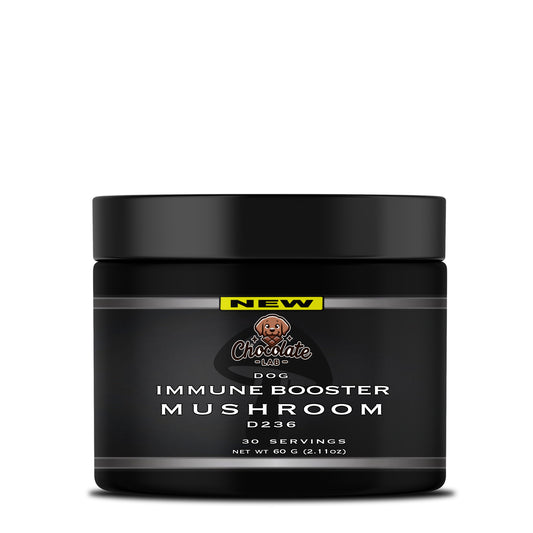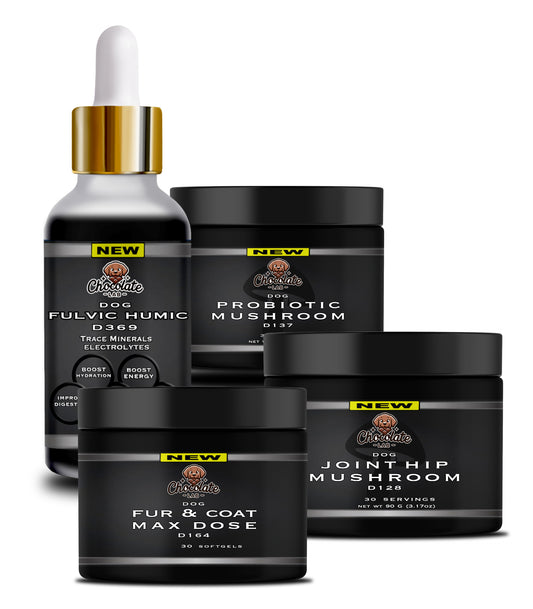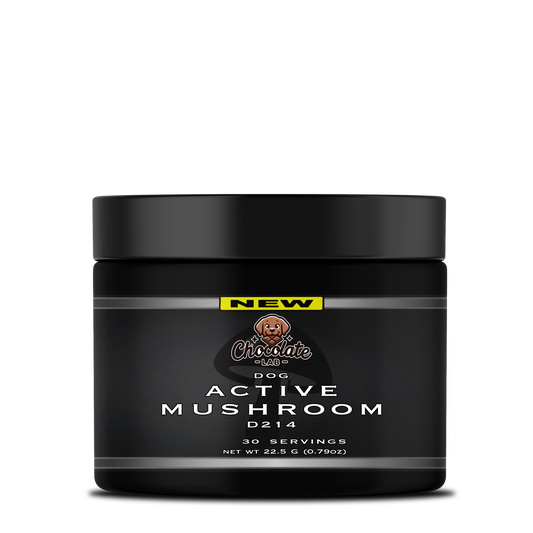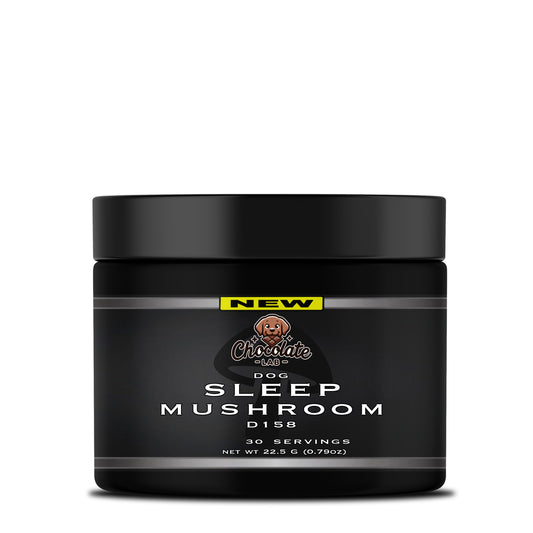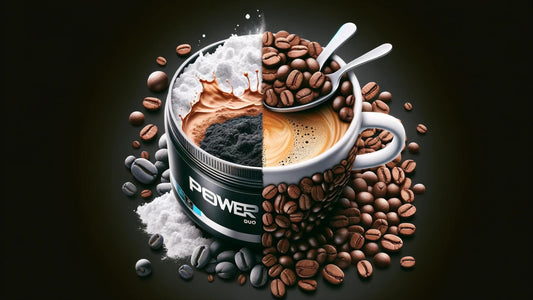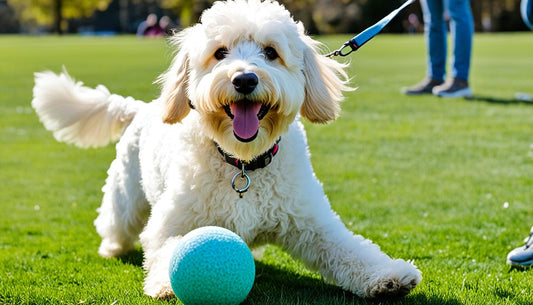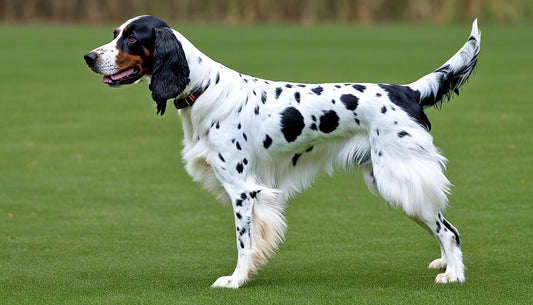The detailed Potcake Dog guide for 2024! Whether you're already a proud owner or considering welcoming one of these unique dogs into your life, this guide is your go-to resource. We'll explore every aspect of living with a Potcake Dog.
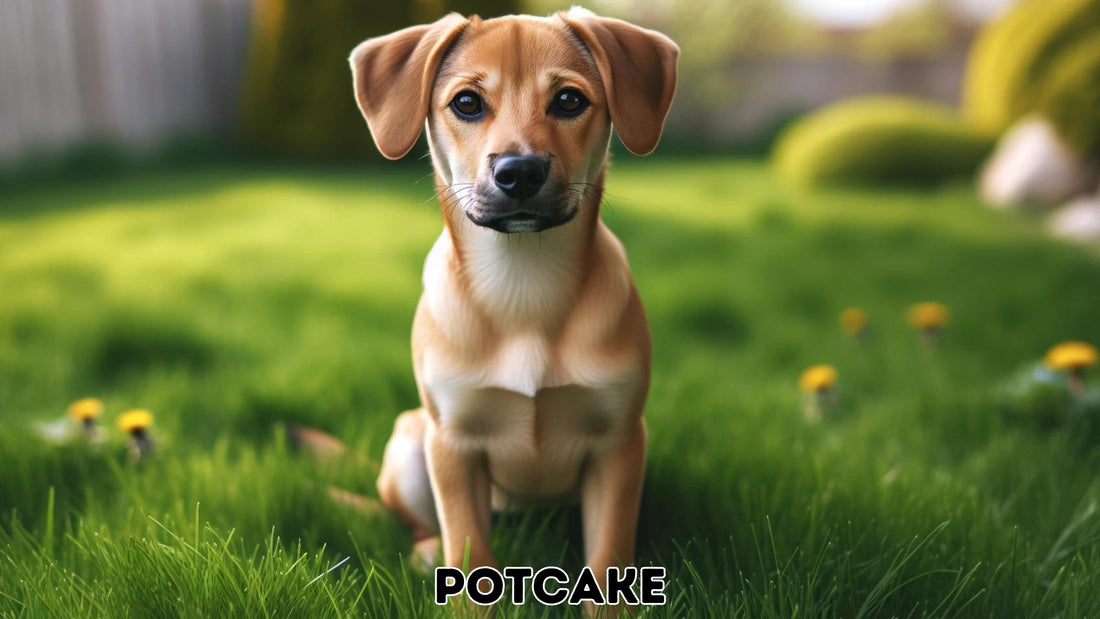
Potcake Dog Breed Information, Puppies & More
Unveiling the Potcake Dog – A Comprehensive Guide for Canine Enthusiasts in 2024
Published on 03/29/2024, 9:30 PM MST
Last Updated on 03/29/2024, 9:30 PM MST
The Essential Guide to Potcake Dogs: Key Takeaways for Enthusiasts

| Key Fact | Detail |
|---|---|
| Origin and Heritage | Potcake Dogs hail from the Caribbean, specifically the Bahamas and Turks and Caicos Islands, showcasing a rich history intertwined with the local culture. |
| Unique Name Origin | The term “Potcake” comes from the Caribbean practice of feeding dogs the caked remnants at the bottom of cooking pots, shaping their identity and resilience. |
| Physical Characteristics | Potcake Dogs feature a medium build, expressive eyes, and a smooth coat, highlighting their distinctive appearance and agile nature. |
| Adaptable Temperament | Known for their friendly and loyal disposition, Potcake Dogs are highly adaptable, making them suitable for various family settings and lifestyles. |
| Health and Longevity | With a lifespan of 10-12 years, Potcake Dogs are generally healthy, but attention to preventive care for conditions like skin allergies and heartworm is crucial. |
| Care Requirements | Regular exercise, mental stimulation, and grooming are essential, along with a balanced diet and routine veterinary check-ups to maintain their well-being. |
| Training and Socialization | Potcake Dogs respond well to positive reinforcement training, with early socialization being key to developing their well-rounded temperament. |
| Rescue and Adoption | Adopting a Potcake Dog is rewarding, offering a chance to provide a loving home to a dog in need while gaining a loyal and affectionate companion. |
Table of Content
- Introduction: Discovering the Potcake Dog
- The Origin and History of the Potcake Dog
- Physical Characteristics of Potcake Dogs
- Temperament and Personality of Potcake Dogs
- Training and Exercise Needs of Potcake Dogs
- Health and Lifespan of Potcake Dogs
- Grooming and Care of Potcake Dogs
- Potcake Dogs in Family and Social Environments
- Male vs. Female Potcake Dogs: Understanding the Differences
- Adopting a Potcake Dog
- Unique Aspects and Misconceptions
- The Pros and Cons of Owning a Merle Goldendoodle
- Cost of Owning a Potcake Dog
- Conclusion: The Reward of Potcake Dog Ownership
- FAQs: Top Questions About Potcake Dogs Answered
Introduction: Discovering the Potcake Dog

The Potcake Dog is a unique breed, indigenous to the Caribbean islands, and has recently garnered attention from dog enthusiasts worldwide. Known for their intelligence and loyal nature, these dogs are named after the local term “potcake,” which refers to the leftover food at the bottom of cooking pots that was traditionally fed to these dogs. Their distinctive appearance, a blend of various breeds, sets them apart with a medium build, smooth coats, and expressive eyes. Adaptability is a hallmark of the Potcake, making them suitable for various lifestyles, from beachside living to city apartments. Their origins can be traced back to the islands of the Bahamas and the Turks and Caicos, where they evolved as a breed by surviving harsh island conditions, leading to a resilient and resourceful nature. This breed’s rising popularity is due to its friendly demeanor and suitability as a family pet, along with its unique history and characteristics. For those considering adopting a Potcake Dog, understanding their background, traits, and care needs is essential for a harmonious relationship.
Key Features of Potcake Dogs
- Origins in the Caribbean: Born out of necessity and survival on the islands.
- Name Derivation: “Potcake” – the term used for leftovers in cooking pots.
- Blend of Breeds: A mix of various breeds contributing to their unique appearance.
- Adaptation Skills: Evolved to thrive in the Caribbean’s diverse environments.
- Upgrade your dog's grooming routine with our Fur & Coat Dog Supplement! Bid farewell to dull fur and hello to silky smooth coats!
Potcake Dogs at a Glance
| Feature | Description |
|---|---|
| Origin | Caribbean Islands |
| Name | Derived from ‘potcake’, a term for cooking leftovers |
| Appearance | Medium build, smooth coat, expressive eyes |
| Traits | Intelligent, loyal, adaptable, friendly |
Quick Tips for Potential Potcake Owners
- Space Consideration: Potcakes adapt well to different living environments.
- Exercise Needs: Regular exercise is essential for their well-being.
- Temperament: Known for their friendly and loyal nature.
The Origin and History of the Potcake Dog
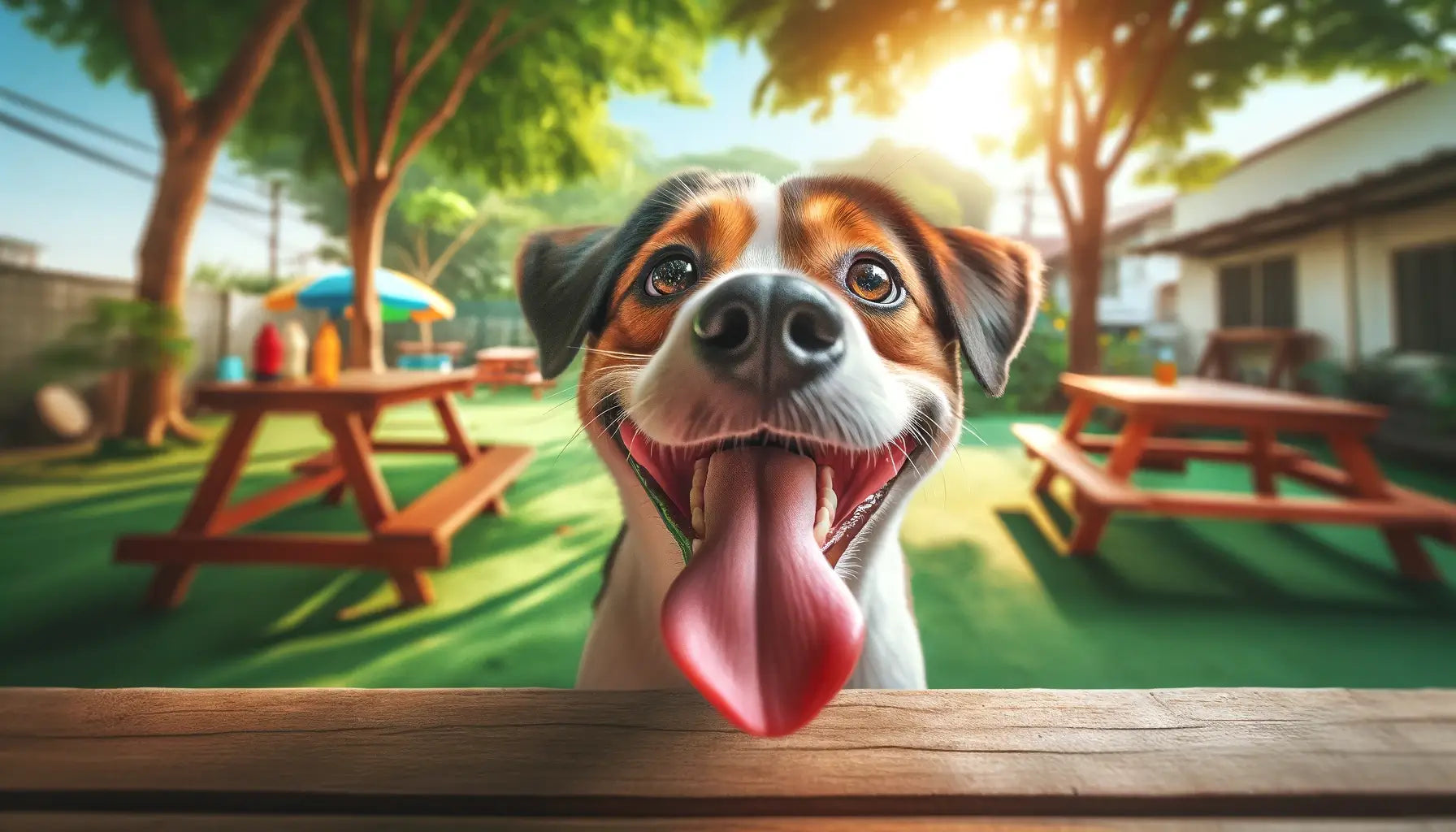
Potcake Dogs have a rich history that is deeply rooted in the culture of the Caribbean. Originating from the Bahamas and Turks and Caicos Islands, they have developed through generations of survival in a tropical environment. The name ‘Potcake’ itself is a nod to the local practice of feeding these dogs scraps from the bottom of cooking pots. This breed is a melting pot of various dogs that arrived on the islands, including those brought by settlers, traders, and sailors. Over time, Potcakes adapted to the harsh island conditions, resulting in a breed known for its resilience, resourcefulness, and robust health. This history contributes to their unique characteristics, making them versatile and adaptable to various lifestyles. Understanding their background is crucial for appreciating the depth of their nature and the bond they form with their owners. Today, the Potcake Dog is celebrated for its rich heritage and has become a symbol of Caribbean canine culture.
Historical Journey of the Potcake Dog
- Island Survival: Evolved through generations in the Caribbean.
- Cultural Significance: Integral part of the local lifestyle and history.
- Resilience and Adaptability: Traits honed through island living.
- Diverse Genetic Makeup: Result of various breeds merging on the islands.
Potcake Dogs Through the Ages
| Period | Development |
|---|---|
| Early Settlements | Arrival with settlers and traders |
| Evolution | Adaptation to island conditions |
| Present Day | Recognized as a unique breed |
Quick Tips for Understanding Potcake History
- Cultural Appreciation: Recognize the breed’s historical and cultural significance.
- Resilience Recognition: Appreciate their survival and adaptation skills.
- Heritage Bonding: Connect with their rich Caribbean heritage.
- Ensure your dog stays in tip-top shape with our Dog Wellness Supplement Bundle! Because a healthy dog is a happy dog!
Physical Characteristics of Potcake Dogs

Potcake Dogs are known for their distinctive physical characteristics that make them stand out. They typically have a medium build, weighing around 30-50 pounds, and are characterized by their smooth, short coats which can vary in color. Their expressive eyes and perky ears give them an alert and intelligent look. Despite their mixed-breed heritage, Potcakes have a relatively uniform appearance, with a sturdy body and a tail that often curls over their back. They are built for agility and endurance, traits that were essential for their survival in the Caribbean. Their physical attributes are not just about aesthetics; they reflect the adaptability and strength of the breed. These dogs are perfectly suited for both tropical climates and more temperate zones, making them versatile companions. Their physical traits are a testament to their resilient lineage and the diverse genetic pool from which they originated.
Potcake Dogs’ Unique Appearance
- Size and Build: Medium-sized with a sturdy physique.
- Coat and Color: Smooth, short coat in various colors.
- Facial Features: Expressive eyes and perky ears.
- Tail and Posture: Tail often curls over the back, symbolizing alertness.
Comparative Physical Traits
| Trait | Potcake Dog | Similar Breeds |
|---|---|---|
| Size | Medium | Similar to Labrador, Border Collie |
| Coat | Short, smooth | Comparable to short-haired breeds |
| Build | Sturdy | Resembles medium-sized working dogs |
Quick Tips for Potcake Physical Care
- Grooming Needs: Regular grooming for their short coat.
- Exercise Routine: Adequate exercise for their agile build.
- Climate Adaptation: Suitable for various climates, adjust care accordingly.
- Invest in your dog's well-being with our Critical Immune Defense for dogs! Don't let sickness take hold – fortify their defenses today!
Temperament and Personality of Potcake Dogs

Potcake Dogs are renowned for their amiable temperament and gentle personality, making them excellent companions. They exhibit a balanced mix of playfulness and calmness, suitable for families and individuals alike. Known for their intelligence, they are quick learners and respond well to training. Potcakes often form strong bonds with their owners, showing a deep sense of loyalty and affection. They are also known for being social with other pets and children, though early socialization is key to fostering these traits. Despite their friendly nature, they can be alert watchdogs, often protective of their home and family. Their adaptability makes them fit into various lifestyles, whether it’s a bustling city environment or a quiet countryside. Understanding and nurturing these personality traits from a young age ensures a well-adjusted and happy Potcake Dog.
The Endearing Nature of Potcake Dogs
- Family-Friendly: Great with children and other pets.
- Intelligence and Trainability: Quick to learn and respond to training.
- Loyalty: Strong bond with their owners.
- Social Behavior: Friendly and adaptable to new environments and people.
Behavior Traits Rating
| Trait | Rating (out of 5) |
|---|---|
| Friendliness | 5 |
| Intelligence | 4 |
| Loyalty | 5 |
| Social Skills | 4 |
Quick Tips for Fostering a Good Temperament
- Early Socialization: Introduce to various environments and people early on.
- Consistent Training: Regular training sessions to enhance their intelligence.
- Bonding Time: Spend quality time to strengthen the bond.
- Invest in your dog's digestive wellness with our Probiotic for dogs! Because a healthy gut is the foundation of overall health!
Training and Exercise Needs of Potcake Dogs
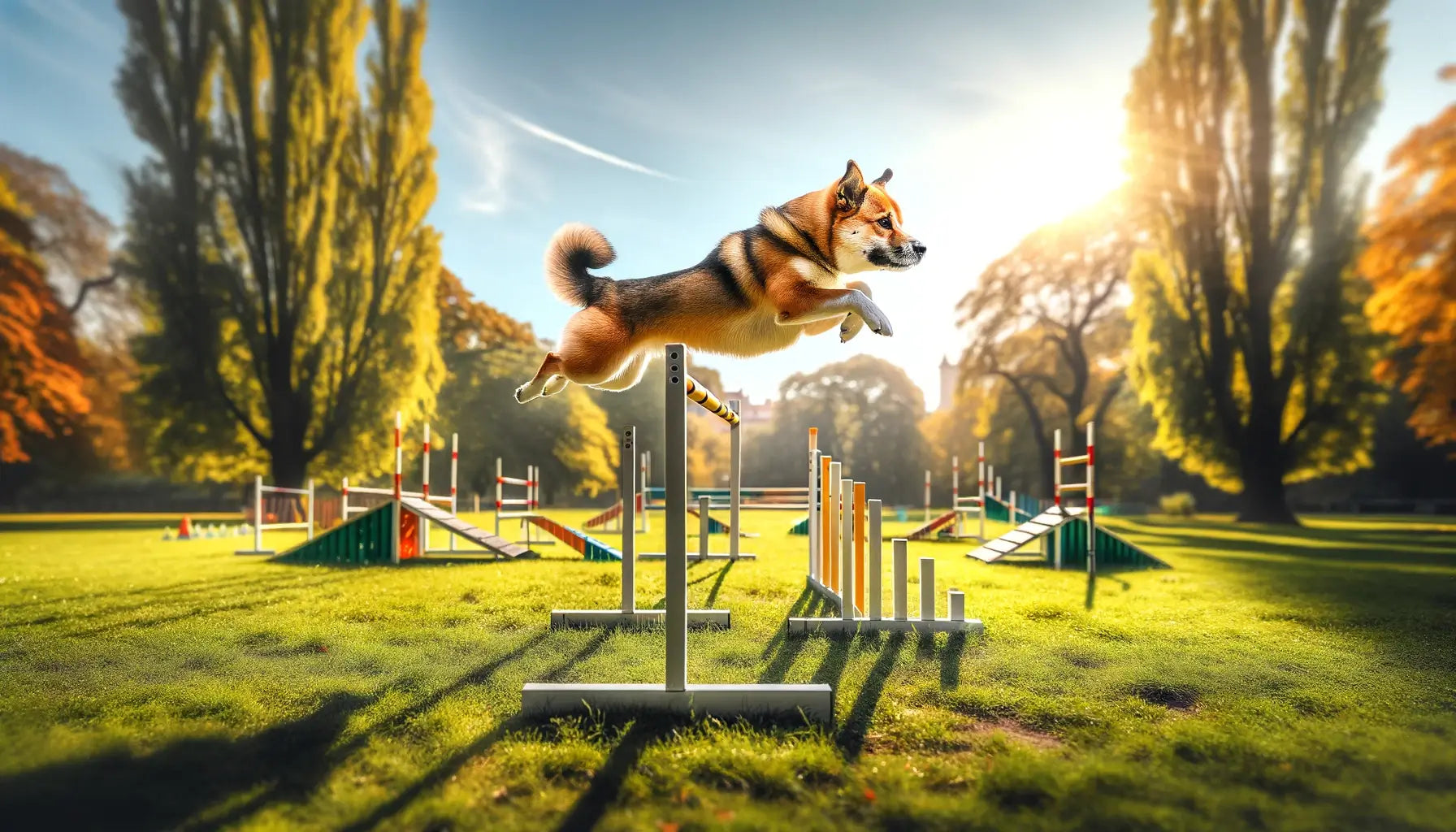
Training and exercise are pivotal for the well-being of Potcake Dogs. Due to their intelligent nature, they respond well to positive reinforcement and consistent training methods. Training should start early to instill good behavior and obedience. Potcakes require a moderate amount of physical exercise daily to maintain their health and happiness. Activities like walking, running, and playing fetch are great ways to keep them physically active. Mental stimulation is just as important, with activities like puzzle toys and hide-and-seek games to keep their minds sharp. Regular exercise also helps in managing potential behavior issues like boredom or anxiety. Creating a balanced routine of physical and mental activities ensures a healthy, well-rounded Potcake Dog.
Effective Training Techniques for Potcake Dogs
- Positive Reinforcement: Rewards-based training works best.
- Consistency: Regular and consistent training sessions.
- Mental Stimulation: Engage them with challenging activities.
- Social Training: Exposure to various environments and situations.
Comprehensive Training and Exercise Regimen for Potcake Dogs
| Day of the Week | Exercise Activity | Duration | Training Focus | Mental Stimulation | Socialization Activity |
|---|---|---|---|---|---|
| Monday | Morning Walk | 30 mins | Basic Commands | Puzzle Toys | Park Visits |
| Tuesday | Agility Training | 45 mins | Leash Training | Interactive Play | Dog Café Socializing |
| Wednesday | Fetch Game | 30 mins | Recall Training | Hide and Seek | Neighborhood Walks |
| Thursday | Jogging or Hiking | 1 hour | Obedience Practice | Treat-Dispensing Toys | Visits to Pet Stores |
| Friday | Playtime with Other Dogs | 40 mins | Social Behavior Training | Scent Tracking Games | Dog Park Interaction |
| Saturday | Swimming (if applicable) | 30 mins | Water Safety Training | Fetch in Water | Beach or Lake Visits |
| Sunday | Rest Day/Short Walk | 20 mins | Relaxation Techniques | Calming Chew Toys | Family Time |
Quick Tips for Training and Exercise
- Routine Development: Establish a regular exercise and training schedule.
- Activity Variation: Keep activities diverse to maintain interest.
- Patience and Understanding: Understand their learning pace and adapt accordingly.
- Stay one step ahead of illness with our Immune Booster for dogs! Keep your dog feeling their best, no matter what comes their way!
Health and Lifespan of Potcake Dogs
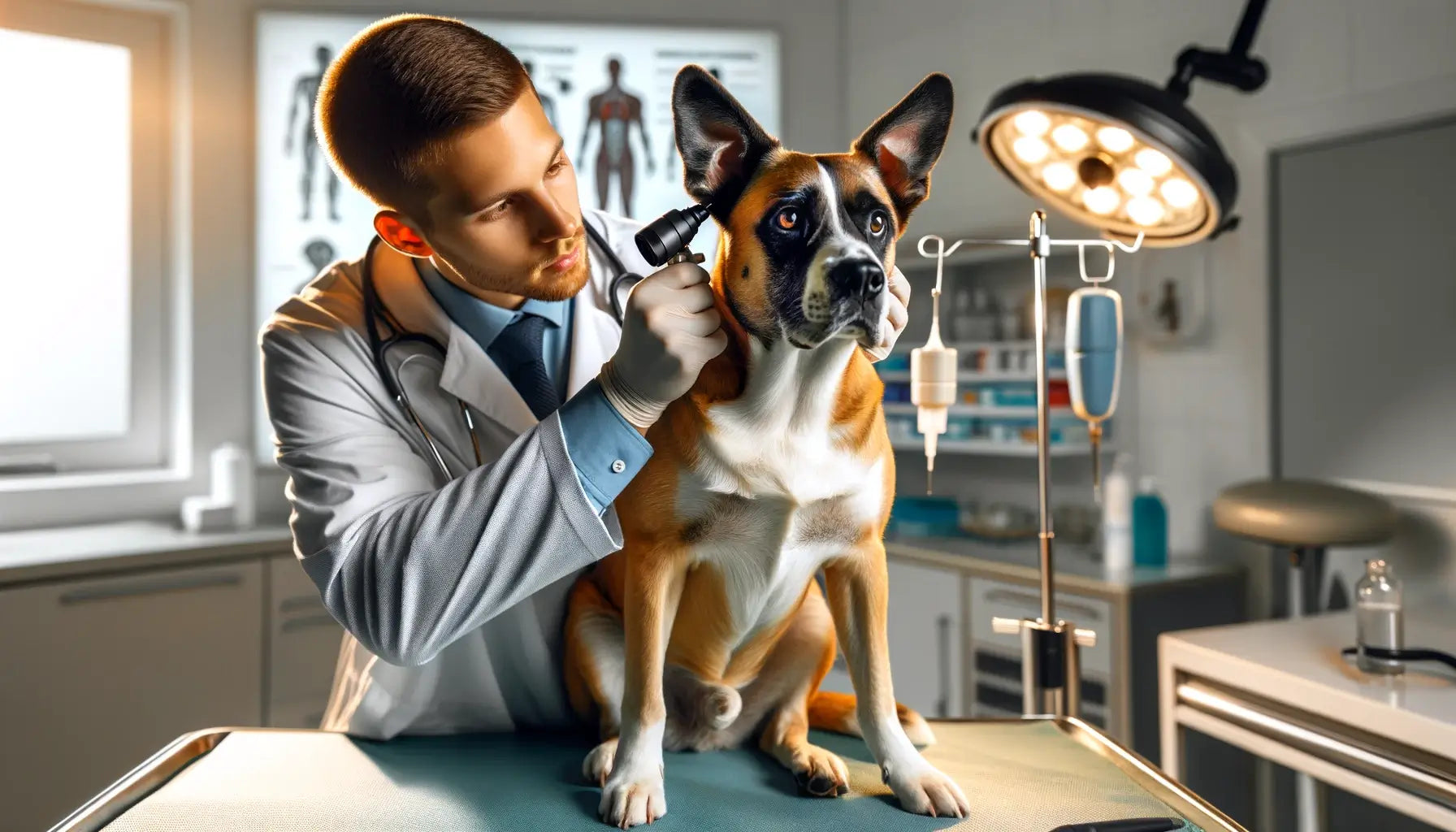
The health and lifespan of Potcake Dogs are aspects that potential owners should carefully consider. Generally, Potcakes are healthy dogs with a lifespan of around 10-12 years. They are less prone to many genetic health issues, thanks to their mixed-breed heritage. However, like all breeds, they may face certain health challenges. Common issues include skin allergies, ear infections, and heartworm, which is prevalent in tropical climates. Regular veterinary check-ups, vaccinations, and preventive care play a crucial role in maintaining their health. A balanced diet, consistent exercise, and mental stimulation contribute significantly to their overall well-being. Understanding and proactively managing these health aspects ensures a long, happy life for a Potcake Dog.
Common Health Concerns in Potcake Dogs
- Skin Allergies: Watch for signs of allergies and manage with proper care.
- Ear Infections: Regular ear cleaning is essential.
- Heartworm: Preventive medication is key, especially in tropical climates.
- General Wellness: Routine health checks and vaccinations.
Health Checklist and Lifespan Comparison
| Health Aspect | Potcake Dog | Similar Breeds |
|---|---|---|
| Lifespan | 10-12 years | Comparable to mixed breeds |
| Common Health Issues | Skin allergies, ear infections | Similar to other medium-sized breeds |
| Preventive Care | Regular check-ups, vaccinations | Essential for all dog breeds |
Quick Tips for Potcake Health
- Regular Vet Visits: Ensure timely vaccinations and check-ups.
- Preventive Measures: Stay proactive in preventing common health issues.
- Balanced Diet and Exercise: Key to maintaining overall health.
- Enhance your dog's bedtime routine with our Sleep Aid for dogs! Say hello to peaceful evenings and rejuvenated mornings!
Grooming and Care of Potcake Dogs
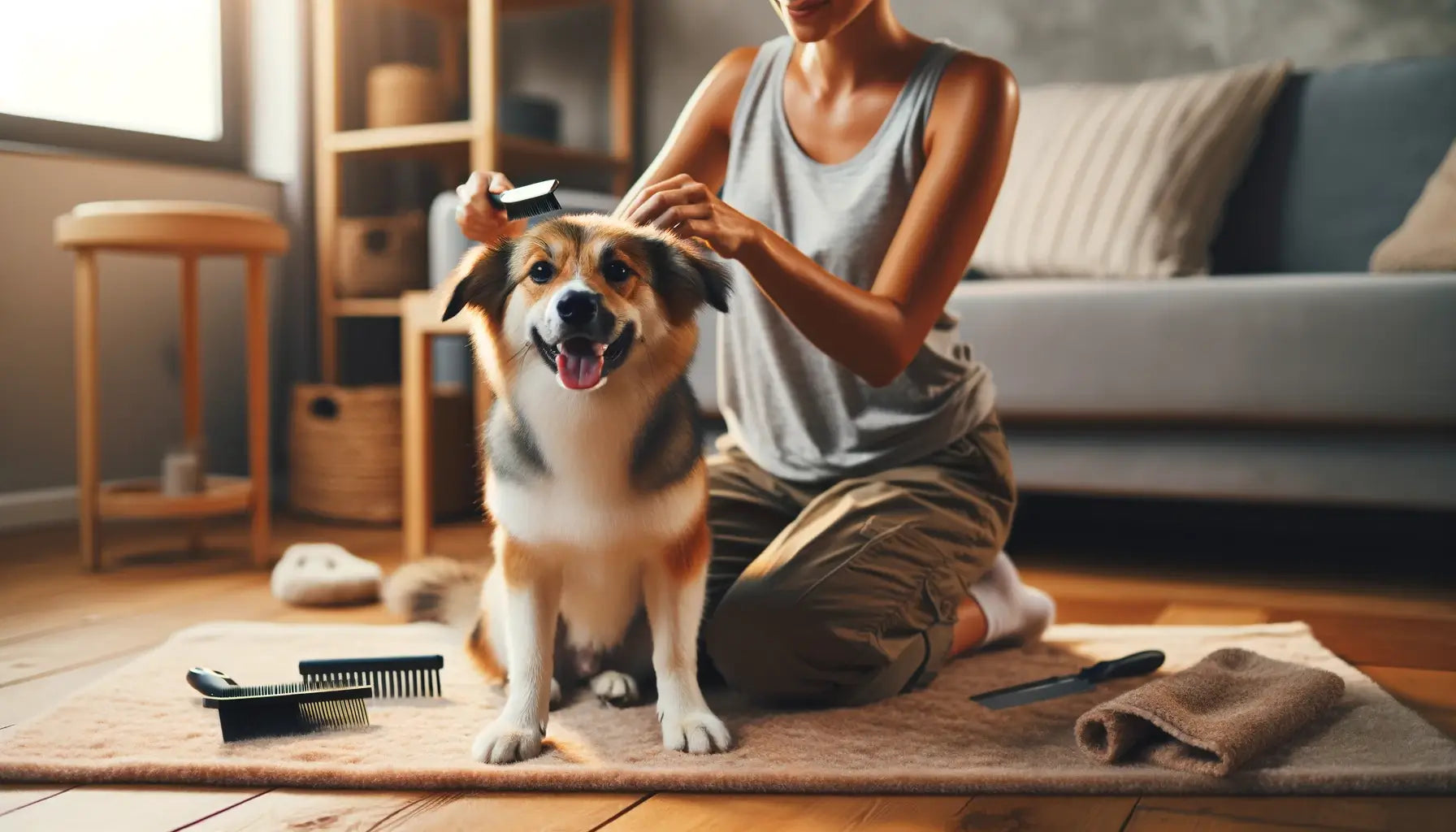
Proper grooming and care are essential for the health and happiness of Potcake Dogs. They have a short, smooth coat that requires regular brushing to remove loose fur and maintain a healthy shine. Bathing should be done as needed, depending on their lifestyle and activity level. Pay attention to their nails, ears, and teeth, as regular maintenance of these areas prevents health issues. Potcakes do not have any special dietary needs, but a balanced diet suitable for their age, size, and activity level is important. They thrive on high-quality dog food that meets their nutritional requirements. Additionally, ensure they have access to fresh water at all times. Regular grooming and proper nutrition play a crucial role in keeping a Potcake Dog in top condition.
Essentials of Potcake Dog Grooming
- Coat Care: Regular brushing to maintain coat health.
- Bathing: As necessary, depending on activity.
- Nail, Ear, and Dental Care: Regular maintenance to prevent issues.
- Dietary Needs: Balanced diet for optimal health.
Essential Grooming Schedule for Potcake Dogs
| Grooming Task | Frequency | Tools Needed | Importance | Tips for Best Results |
|---|---|---|---|---|
| Coat Brushing | Twice a week | Soft Bristle Brush | Reduces Shedding | Brush in direction of fur |
| Bathing | Monthly | Dog Shampoo, Towels | Skin Health | Use lukewarm water |
| Nail Trimming | Monthly | Nail Clippers, File | Prevents Overgrowth | Trim carefully to avoid quick |
| Ear Cleaning | Bi-weekly | Ear Cleaner, Cotton Balls | Infection Prevention | Be gentle and thorough |
| Dental Care | Daily | Dog Toothbrush, Toothpaste | Oral Health | Brush gently along gums |
| Eye Cleaning | As needed | Soft Cloth, Eye Solution | Eye Health | Wipe away any discharge |
Quick Tips for Potcake Care
- Regular Grooming: Maintain a consistent grooming schedule.
- Diet Monitoring: Choose a diet suitable for their age and size.
- Health Check-ups: Regular visits to the vet for overall wellness.
- Transform your dog's health with our Fulvic Acid Dog Supplement! Because nature knows best when it comes to wellness!
Potcake Dogs in Family and Social Environments
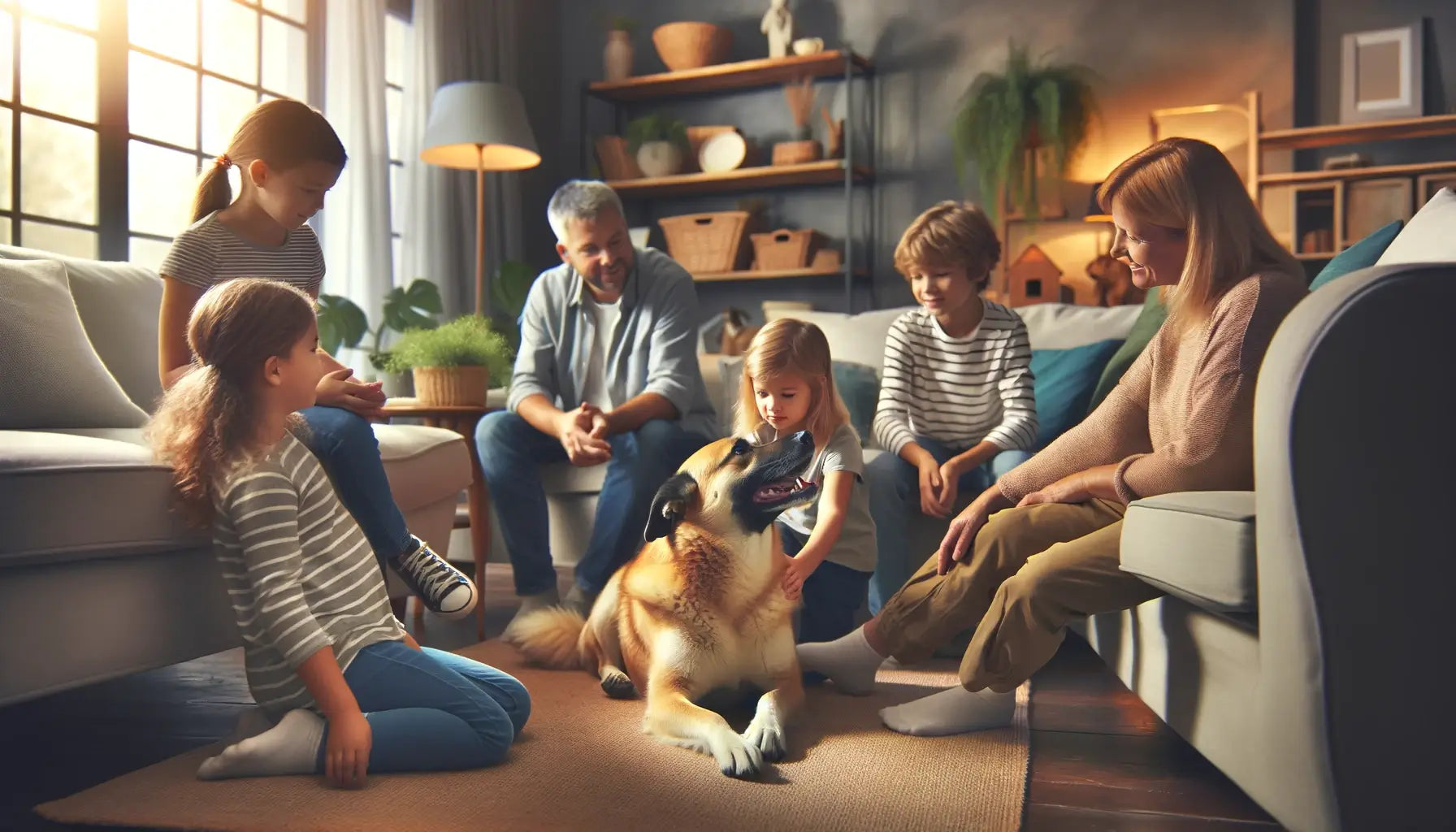
Potcake Dogs are exceptionally versatile and adaptable, making them ideal pets for various family settings. Their friendly nature makes them great companions for children, often showing patience and gentleness. In social situations with other pets, they generally exhibit a harmonious demeanor, provided they have been properly socialized. Potcakes thrive in an environment where they are part of the family, enjoying interaction and participation in family activities. They are known to be protective of their home and loved ones, showcasing a balanced mix of affection and watchfulness. Early socialization is key to ensuring they are comfortable and well-behaved around new people and animals. Their ability to adapt to different living situations, from apartments to houses with yards, makes them a flexible choice for many potential dog owners. Understanding and nurturing their social needs is essential for a harmonious integration into family life.
Behavior in Family Settings
- Child-Friendly: Gentle and patient with children.
- Pet Compatibility: Good with other pets, especially when socialized early.
- Protectiveness: Natural tendency to guard their home and family.
- Adaptability: Comfortable in various living environments.
Family and Social Suitability Rating
| Setting | Suitability Rating |
|---|---|
| With Children | High |
| With Other Pets | High |
| In Apartments | Moderate |
| In Houses with Yards | High |
Quick Tips for Social Integration
- Early Socialization: Introduce them to various settings and beings early.
- Family Activities: Include them in family events and outings.
- Training for Social Skills: Reinforce positive behavior in social settings.
- Unlock the secret to happy, healthy joints with our Dog Joint Supplement! Keep your furry friend active and thriving!
Male vs. Female Potcake Dogs: Understanding the Differences

Understanding the differences between male and female Potcake Dogs can help potential owners make an informed decision based on their preferences and lifestyle. While both genders share many similarities in terms of temperament and behavior, there are some notable distinctions in physical characteristics and certain personality traits. Male Potcake Dogs may exhibit more dominant behaviors, especially around other male dogs, whereas females tend to be more nurturing and less territorial. Intact males may display more aggressive tendencies, particularly during mating season, whereas females may exhibit maternal instincts but are generally less prone to aggression. Both male and female Potcakes are trainable, but males may require firmer and consistent training due to their tendency to assert dominance. In terms of physical size and appearance, male Potcake Dogs are typically slightly larger and heavier than females, although the difference may not be significant. Males may have more pronounced musculature, especially in the shoulders and neck, while females tend to have a slightly more slender build. While coat texture can vary among individuals, some owners report that males may have slightly thicker or coarser coats compared to females.
Health and Temperament Considerations
- Health Risks: Neutering or spaying can reduce the risk of certain health issues such as testicular or ovarian cancers, respectively, in both male and female Potcakes.
- Temperament Changes: Some owners observe changes in behavior after neutering or spaying, such as reduced aggression or marking behaviors in males and a calmer demeanor in females.
- Hormonal Influence: Intact males may exhibit behaviors influenced by testosterone levels, such as roaming or mounting, whereas intact females may experience heat cycles and related behaviors.
Side-by-Side Comparison Chart for Male and Female Potcake Dogs
| Aspect | Male Potcake Dog | Female Potcake Dog |
|---|---|---|
| Size | Slightly larger | Slightly smaller |
| Coat Texture | Possibly thicker | Slightly softer |
| Behavioral Tendencies | More dominant | More nurturing |
| Trainability | May require firmer training | Responsive to consistent training |
Quick Tips for Choosing Between Male and Female Potcake Dogs
- Consider Lifestyle: Assess your lifestyle and preferences to determine which gender may be a better fit for your household.
- Consult with Breeders or Shelters: Seek advice from reputable breeders or shelter staff who can provide insights into the personalities and temperaments of available male and female Potcake Dogs.
- Evaluate Individual Temperament: While gender can play a role in behavior, each Potcake Dog is unique, so spend time getting to know individual dogs before making a decision.
- Spaying and Neutering: Consider the potential health benefits and behavioral changes associated with spaying or neutering when deciding on the gender of your Potcake Dog.
- Enhance your senior dog's quality of life with our Senior Dog Bundle! Because they deserve to enjoy every moment to the fullest!
Adopting a Potcake Dog

Adopting a Potcake Dog is a rewarding experience, but it requires careful consideration and planning. It’s crucial to research and find reputable adoption centers or rescue organizations that focus on Potcake Dogs. Prospective owners should be prepared for a lifetime commitment, understanding the responsibilities that come with dog ownership. Questions regarding the dog’s history, health, and temperament should be asked before adoption. It’s important to assess your living situation and lifestyle to ensure it aligns with the needs of a Potcake Dog. These dogs often come from tough backgrounds, so patience and empathy are key during their adjustment period. Preparing your home and family for the arrival of a Potcake Dog, including setting up a comfortable space and purchasing necessary supplies, is essential. Adopting a Potcake Dog not only provides a loving home to a deserving animal but also brings immense joy and companionship.
Considerations for Potcake Adoption
- Researching Adoption Sources: Find reputable centers or rescues.
- Lifestyle Compatibility: Ensure your home and habits suit a Potcake.
- Understanding Responsibilities: Acknowledge the commitment involved.
- Preparation for Arrival: Set up a welcoming environment for the dog.
Adoption Checklist
| Item | Description |
|---|---|
| Adoption Source | Reputable rescue or adoption center |
| Home Preparation | Comfortable living space, essential supplies |
| Lifestyle Assessment | Compatibility with dog’s needs |
| Commitment Understanding | Acknowledgment of long-term responsibilities |
Quick Tips for Adopting a Potcake Dog
- Assess Compatibility: Ensure the Potcake’s needs match your lifestyle.
- Be Patient: Allow time for adjustment and bonding.
- Stay Informed: Educate yourself about the breed and its needs.
- Enhance your active dog's vitality with our Active Dog Supplement! Because every activity should be met with enthusiasm and energy!
Unique Aspects and Misconceptions

Potcake Dogs have several unique aspects that set them apart from other breeds. Their history and evolution in the Caribbean contribute to their distinctive personality and physical traits. They are known for their intelligence, loyalty, and versatility, making them excellent companions. However, there are misconceptions about Potcake Dogs, like the belief that they are always easygoing or that they require less care due to their mixed-breed status. In reality, like all dogs, Potcakes need proper training, socialization, and care to thrive. They are also often mistaken for being exclusively outdoor dogs; however, they enjoy being part of the family indoors as well. Understanding these unique traits and clearing up misconceptions is crucial for prospective owners to form realistic expectations. Embracing the true nature of a Potcake Dog leads to a more fulfilling and harmonious relationship.
Distinct Characteristics of Potcake Dogs
- Intelligence and Adaptability: Quick learners with a flexible nature.
- Physical Robustness: Strong and healthy due to mixed breed heritage.
- Social and Loyal: Great family pets with a protective instinct.
- Misconceptions Addressed: Clearing up common misunderstandings.
Fact vs. Myth
| Aspect | Fact | Myth |
|---|---|---|
| Nature | Friendly, but requires training and socialization | Naturally easygoing without effort |
| Care Needs | Needs regular care and attention | Requires less care due to being mixed breed |
| Indoor/Outdoor | Enjoys being part of the family indoors | Exclusively outdoor dogs |
Quick Tips for Understanding Potcake Traits
- Learn About Their History: Understand their background for better insight.
- Acknowledge Their Needs: Recognize their requirement for care and attention.
- Dispel Myths: Educate yourself and others about common misconceptions.
The Pros and Cons of Owning a Merle Goldendoodle

Owning a Potcake Dog comes with numerous advantages, making them a desirable choice for many individuals and families. These dogs offer unparalleled companionship, known for their unwavering loyalty and affectionate nature. Additionally, Potcake Dogs are remarkably adaptable, thriving in various living environments, whether it's a cozy apartment or a spacious suburban home. Their resilience is commendable, having been raised in challenging conditions, which has instilled in them a sense of resourcefulness and adaptability. Moreover, adopting a Potcake Dog from a shelter not only benefits the owner but also provides a loving home for a deserving dog in need. Each Potcake Dog boasts a unique personality, adding vibrancy and joy to any household they become a part of.
Considerations of Owning a Potcake Dog
- Grooming Needs: While Potcake Dogs typically have short coats, they may still require regular grooming to maintain their appearance and hygiene.
- Training Requirements: Like all dogs, Potcake Dogs benefit from consistent training and socialization to ensure they become well-behaved companions.
- Health Concerns: While generally healthy, Potcake Dogs may be prone to certain health issues common among mixed-breed dogs, such as hip dysplasia or allergies.
- Rescue Background: Some Potcake Dogs may come from challenging backgrounds, requiring patience and understanding as they adjust to their new home.
- Potential Behavioral Issues: Due to their history as strays, some Potcake Dogs may exhibit behavioral challenges, such as separation anxiety or fearfulness, which may require professional guidance and support.
Pros and Cons Comparison Table
| Aspect | Pros | Cons |
|---|---|---|
| Companionship | Offers loyalty and affectionate companionship. | May require time and effort to build a strong bond. |
| Adaptability | Can thrive in various living environments. | Adjustment period may be needed when transitioning to a new home. |
| Resilience | Demonstrates resilience and resourcefulness. | Previous trauma or neglect may require additional support and care. |
| Health Benefits | Adoption can provide health benefits for both owner and dog. | Potential health issues may require regular veterinary care. |
| Unique Personality | Each dog has its own unique charm and personality. | Behavioral challenges may arise due to past experiences or trauma. |
Quick Tips for Prospective Potcake Dog Owners
- Research Breeds: Take the time to research the characteristics and care needs of Potcake Dogs to ensure they align with your lifestyle and preferences.
- Consider Adoption: Explore adoption options through reputable shelters and rescue organizations to provide a loving home to a deserving dog.
- Prepare for Challenges: Be prepared to invest time, patience, and effort into training, socializing, and caring for your Potcake Dog.
Cost of Owning a Potcake Dog

Owning a Potcake Dog involves various costs, from initial adoption fees to ongoing care expenses. The initial cost can vary depending on the adoption source but generally includes a nominal fee to cover basic medical expenses like vaccinations and spaying/neutering. The ongoing costs include high-quality dog food, routine veterinary care, grooming supplies, and accessories like collars, leashes, and toys. Emergency medical expenses should also be considered, as unexpected health issues can arise. Regular grooming and preventive health measures, like flea and tick treatments, contribute to additional costs. Training classes or materials may also be necessary, especially for first-time dog owners. Budgeting for these expenses ensures that you can provide a Potcake Dog with a comfortable and healthy life. Being aware of the financial commitment involved is crucial in making an informed decision about dog ownership.
Financial Aspects of Potcake Ownership
- Initial Adoption Fees: Cover basic medical procedures.
- Routine Expenses: Food, grooming, and regular veterinary care.
- Emergency Funds: For unforeseen health issues.
- Additional Costs: Training, accessories, and preventive health care.
Potcake Dog Ownership: Cost Analysis
| Expense Category | Initial Cost (USD) | Monthly Cost (USD) | Annual Cost (USD) | Notes |
|---|---|---|---|---|
| Adoption Fee | $50 - $300 | - | - | Includes initial medical care |
| Food | - | $30 - $70 | $360 - $840 | Depends on brand and size |
| Grooming Supplies | $50 - $100 | $5 - $10 | $60 - $120 | Brushes, shampoos, etc. |
| Veterinary Visits | $100 - $200 | - | $100 - $300 | Check-ups and vaccinations |
| Accessories (Beds, Leashes) | $50 - $200 | - | - | One-time purchase |
| Training Materials/Classes | $50 - $200 | - | - | Optional, for new owners |
| Emergency Fund | - | - | Variable | For unexpected expenses |
| Total | $300 - $1000 | $35 - $80 | $520 - $1260 | Excluding emergency fund |
Quick Tips for Budgeting
- Plan Ahead: Estimate and plan for regular and unexpected expenses.
- Prioritize Health: Allocate funds for routine and emergency veterinary care.
- Smart Purchasing: Choose quality over quantity for food and supplies.
Conclusion: The Reward of Potcake Dog Ownership

Owning a Potcake Dog is a deeply rewarding experience, filled with companionship, love, and joy. These dogs bring a unique blend of intelligence, loyalty, and adaptability to any home. Their versatility makes them suitable for various lifestyles, whether in a bustling city or a quiet suburban setting. The bond formed with a Potcake Dog is profound, as they are known for their deep affection and commitment to their family. While they require regular care, training, and socialization, the effort is immensely gratifying. The journey of owning a Potcake Dog is one of learning, growth, and mutual respect. As a Potcake owner, you not only provide a loving home to a deserving animal but also gain an irreplaceable furry family member. The joy and fulfillment of having a Potcake Dog in your life are unparalleled, making every challenge worth it.
Embracing the Potcake Dog Experience
- Unmatched Companionship: Deep, meaningful bond with the owner.
- Joyful Addition to the Family: Brings happiness and liveliness.
- Learning and Growth: Both the dog and owner benefit from the relationship.
- Life-Changing Impact: Significant positive influence on lifestyle and well-being.
Summary of Key Points
| Aspect | Key Point |
|---|---|
| Temperament | Friendly, loyal, and adaptable |
| Care Requirements | Regular grooming, exercise, and veterinary care |
| Adoption | Rewarding process with a focus on compatibility |
| Costs | Budgeting for various expenses |
| Fulfillment | Deep bond and joy in the relationship |
Quick Tips for Future Potcake Owners
- Understand the Commitment: Recognize the responsibilities involved.
- Be Prepared for Challenges: Embrace the learning curve with patience.
- Enjoy the Journey: Cherish every moment with your Potcake Dog.
FAQs: Top Questions About Potcake Dogs Answered

Addressing common questions about Potcake Dogs can provide valuable insights for prospective and current owners. These FAQs cover a range of topics, from care and behavior to health and ownership. Each question and answer includes essential information, ensuring a better understanding of this unique breed.
Top 15 Potcake Dog Questions
| Question | Answer |
|---|---|
| What is the typical temperament of a Potcake Dog? | Potcake Dogs are known for their intelligence, loyalty, and friendly nature. They adapt well to family life and are great with children and other pets. |
| How much exercise does a Potcake Dog need? | A Potcake Dog requires moderate daily exercise like walking, playing, or agility activities to stay healthy and happy. |
| What are the common health issues in Potcake Dogs? | They are generally healthy but can face issues like skin allergies, ear infections, and heartworm. Regular vet check-ups are important. |
| How should I train my Potcake Dog? | Use positive reinforcement and consistent training methods. Potcake Dogs are intelligent and respond well to patient, reward-based training. |
| What is the lifespan of a Potcake Dog? | Potcake Dogs typically live for about 10-12 years, with proper care and a healthy lifestyle. |
| What are the grooming needs of a Potcake Dog? | Regular brushing, occasional baths, and routine care for nails, ears, and teeth are essential for Potcake Dogs. |
| Are Potcake Dogs good with children? | Yes, Potcake Dogs are usually very patient and gentle with children, making them excellent family pets. |
| How much does it cost to own a Potcake Dog? | Costs include adoption fees, regular food and grooming expenses, veterinary care, and occasional unforeseen costs. Budgeting is key. |
| What should I feed my Potcake Dog? | A balanced diet suitable for their age, size, and activity level is important. Consult a vet for specific dietary needs. |
| Can Potcake Dogs adapt to apartment living? | Yes, Potcake Dogs are adaptable and can live comfortably in apartments, provided they get enough exercise. |
| Are Potcake Dogs easy to train? | Their intelligence makes them relatively easy to train, but consistency and patience are important. |
| What is the origin of Potcake Dogs? | Potcake Dogs originate from the Caribbean, specifically the Bahamas and Turks and Caicos Islands. |
| How do I socialize a Potcake Dog? | Early socialization in various environments and with different people and pets is important for a well-adjusted Potcake Dog. |
| Can Potcake Dogs handle cold weather? | While they are more accustomed to tropical climates, they can adapt to colder weather with proper care and clothing. |
| How do I find a reputable Potcake Dog adoption center? | Research thoroughly, look for reviews, and visit centers to ensure they follow ethical practices and provide healthy, well-cared-for dogs. |

